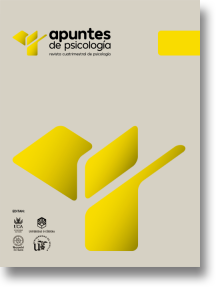Family variables associated with children’s antisocial behaviour: The role of type of family structure
Abstract
This paper has two mains aims: to examine differences in variables associated with antisocial behaviour between types of family structure, and to analyze the association between family structure and antisocial behaviour. The sample consisted of 214 families composed by parents and children aged from 3 to 10 years. Six different types of family structure were considered in the study: traditional, single, step, adoptive, lesbian and gays and multiple births families. Results showed high homogeneity in variables associated with antisocial behaviour between types of family structure. Moreover, results indicated that when third-variable effects were controlled, antisocial behaviour did not show significant relationship with the type of family structure. This last result leads to the conclusion that it is not the family structure itself a risk factor to children’s antisocial behaviour.
CITE AS:
Antolín Suárez, L., Oliva Delgado, A. & Arranz Freijo, E. (2009). Variables familiares asociadas a la conducta antisocial infantil: el papel desempeñado por el tipo de estructura familiar. Apuntes de Psicología, 27, 475-487.

















